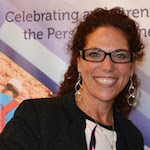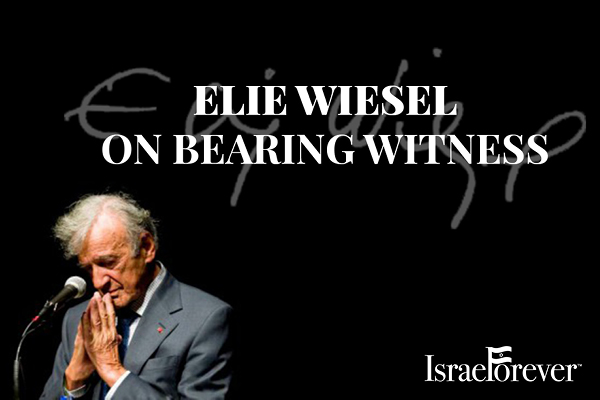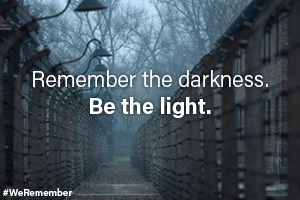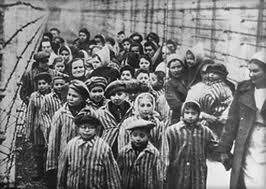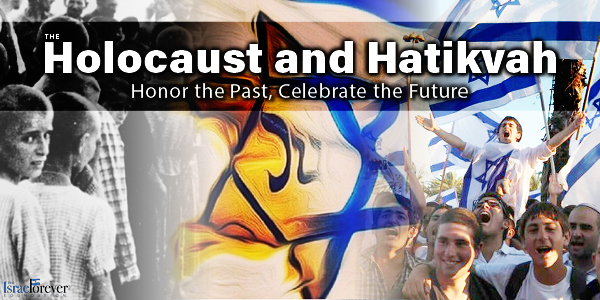Memory Leading Memory: Lessons I learned from Elie Wiesel
If you ask a young Jewish boy or girl today to name a leader they admire, it is quite possible that we, the parents, educators, community leaders and laypersons alike, would be disappointed in the answers they gave. Their responses would affirm the sad fact that social icons, celebrities and other famous personalities, more than any others, have become identified as “leaders” without truly doing anything that possesses the ephemeral values of leadership. Using their name and resources, they become self-proclaimed experts without sufficient knowledge or authority to talk on the subject, and without recognizing the responsibility involved in presenting themselves as “leaders.”
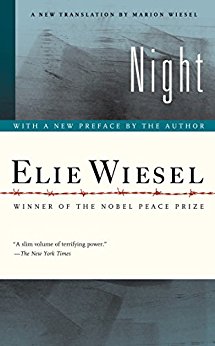
When I think of the leaders who I have admired and learned from over the years, my mind is awash with countless names of those who have served as an inspiration in my life and my work. Each possessed vast knowledge and a burning, passionate drive to advance their respective causes. Each embodied a desire to seek positive change with integrity drawn from a respect for the past and its implications on the present.
Elie Wiesel, my teacher, my mentor, stands out as one man who made an impact in immeasurable ways. Sadly, many of my younger students today have never heard of him, and might never know of the power and influence this one man had - on Jews, and on the world as a whole. Most have never or might never read any of his other writings - so rich with vibrant depictions of a world that once was, both in Jewish history and in Jewish imagination. Perhaps they have read Night, perhaps not. But most will always know of Elie Wiesel as the public face of the Holocaust survivor and a voice of moral conscience whose words have meaning and relevance for anyone looking to find a deeper understanding of the many themes woven into his writing.
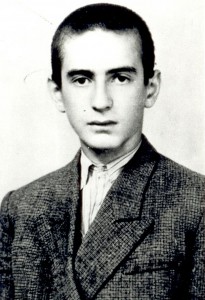
A young Elie Wiesel, courtesy of Elie Wiesel Foundation for Humanity
When Elie was a young boy, he did not yet know his potential, or that he would become a leader of the Jewish people in a most unique way. Who before him served such a role - helping to heal the wounds of the past by trying to address the pains of the present? Religious leaders, spiritual guides, community activists, and teachers - of course the teachers - all sought to uphold the ideals of ethics, morality, integrity, pride, honor.
The lucky among us are familiar with the names of such individuals from the annals of Jewish history - Abraham, Moses, King David, of course, but also Joshua, Miriam, Akiva, Hillel, Mordecai, Ester, Maimonides, Baal Shem Tov, Kotzker, Baeck, Kalischer, Isserles, Hirsch, Kaplan, Kook, Weizmann, Sokolow, Thon, Katz, Fackenheim, Ben Gurion, Golda, Netanyahu, Hoenlein, Sacks, and of course Elie Wiesel and so so many others - all names that should be passed down from generation to generation as examples of leadership to be emulated generation after generation.
A man of unique charisma, talent, and eloquence, Elie Wiesel faced every situation with vision, courage and humility. He touched on world issues while never deviating from what he saw as the core of his being: Jewish faith, Jewish identity, and the relevance of Israel to every single Jew in the world. He embodied, for me and so many others, what it meant to be a Jewish leader.
In his classrooms, lectures, or even personal encounters, Professor Wiesel led us through each piece of literature of memory, dissecting the words and the images from the hidden messages that shed light on the personal, ever-human experiences. He led us through Biblical anecdotes and complex manifestations of humanity, of God, of evil, of silence. He led his students with his words and with his passion, every single person who heard him speak witnessed him share his introspections and interpretations with precision, with depth, and with meaning.
Year after year, I listened intently to every word of his lectures at Boston University. Each time, in a room of thousands or dozens, I felt how his words spoke to me, were addressed as if to me in particular, giving me purpose and direction. He was my guide. That was one of his many talents - whatever his topic, he found a way to shape words to suit each circumstance, each context, each philosophical or rational or logical chain of thought so as to help the listener engage with both complex and simplistic topics at the same time.
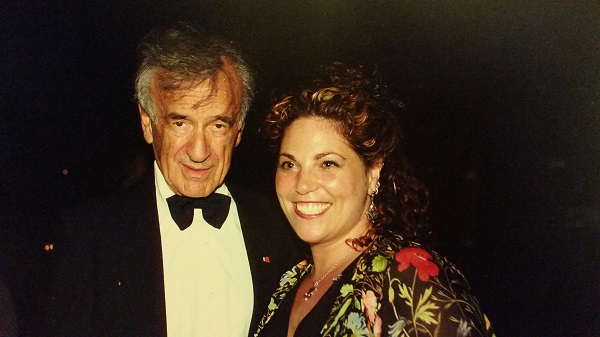
He could speak of the Bible, of prophets, of rebbes and help make it palatable to common Jew who may not otherwise have entered into that realm. He somehow knew implicitly what that particular group of learners needed to hear. Even if they didn’t know it.
He inspired audience after audience because he made the past ever-present, and the present ever-meaningful.
It was Elie who taught me to be careful of the pain we can cause in our determination to transmit the experiences of the Holocaust into collective memory. He warned of the tears that will fall from the eyes of others while we ourselves swallow that pain, bury it within even as we strive to teach the world from the very essence of that pain.
But this is not a lesson he imparted in his thousands of speeches around the world. No. Professor Wiesel rarely spoke directly or graphically about the experience of suffering in the ghetto, on the train, in the camps, or in the eternal nightmare after his survival. He felt that Auschwitz and Buchenwald were beyond communication and comprehension for anyone who did not experience it themself, declaring “those who were not there cannot understand.”
For him, that experience was too delicate to touch, to define, to put any terms of reference on. I, however, chose to identify what I believe would be an aide to the transmission of understanding of the pain of the past to the generations of the future: momentary survival. This is the state of mind wherein life, survival, could not be measured in increments of time, but rather from experience to experience.
This method of survival is similar to our method of transmitting memory - it is impossible to comprehend the full picture, it is possible to understand moments in time and their meaning, building one on top of the other, step by step creates a more complete understanding, allowing us to formulate a memory we who were not there can pass on to future generations who must not forget.
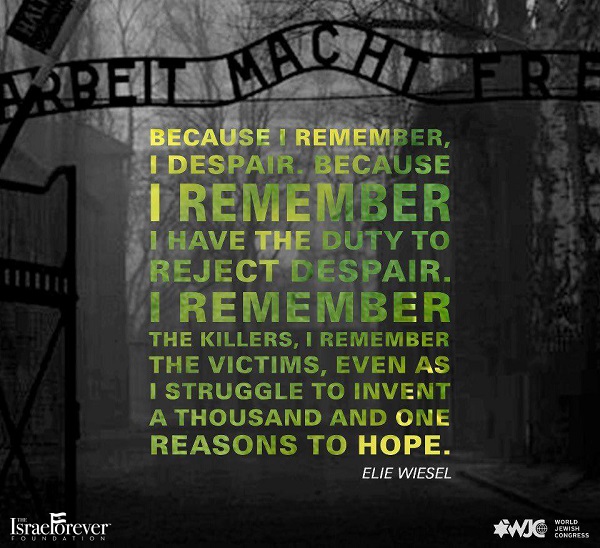
And after 11 years of debating with Elie, I still feel propelled by the passion we shared. For just as he taught, he listened. And he listened with a whole heart, even when we disagreed. He listened most especially when facing the difficult questions, reminding me again and again that I must protect every question as much as the answers, and that I should record in my mind the questions so as to be asked again and again. He listened, he heard, and in the true form of a Jewish leader, he would respond with more questions, push me further, challenging me again and again as I continue to do with students of my own. His unique form of listening taught me how to be a better teacher, how to be, in my own way, a voice of memory.
Elie Wiesel is considered to be the proverbial “conscience of the world,” having gained fame through his determination to protect Holocaust memory and to fight for Jewish and human rights wherever and whenever necessary. In his leadership, Wiesel challenged presidents, heads of state, administrations and the common man. A voice that challenged easy complacency about history, his life was driven towards perpetuating memory. As he said at the Nobel Peace Prize ceremony in 1986. “I have tried to fight those who would forget. Because if we forget, we are guilty, we are accomplices.” And so it is our responsibility, as Elie taught us, to speak truth to power and to hold power accountable to truth.
I have been blessed to learn from one of the great leaders of the Jewish world, I have taught about leaders throughout Jewish history, and I have had the privilege to educate some of the great leaders of the Jewish people today. It was with Professor Wiesel in my mind and in my heart that I have led leaders, ambassadors, educators, survivors and their descendants, and the youth who represent the next generation of knowledge and memory.
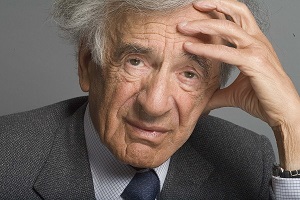
On every journey, Elie was there with us, as we walked day after day, recounting history, human experience, and exploring their inherent messages for humanity. His memory served as our guide as I read of his memoirs and we discussed his theories on our journey as we transversed the grounds of memory there in Poland.
Elie’s ideas on suffering, faith, hope, survival and, yes, leadership served as an example as we explored the role and responsibility of Jewish leaders today as we face the rising hate against our people and our state. As we inherited the particularity of things too terrible to be believed but not too terrible to have happened, it was abundantly clear to me how memory of the past can lead memory of the future toward a realization of the lessons that we continue to ignore at our peril.
Wiesel spent the majority of his public life speaking of the atrocities he had witnessed and asking the public to consider other acts of cruelty around the world, although he drew the line at direct comparisons with the Holocaust. Ambassador Dermer, of a different time, a different history, and facing a different generation of advocates and enemies, is one such individual who has chosen to carry on that legacy of leadership bestowed by those before him as an articulate and passionate defender of the Israel and Jewish people. I am honored to have been able to be a part of connecting the generations, helping transmit the memory of the past, the memories of what I learned from my teacher to help protect the legacy of our people, for the future.
With the shifting dynamic of Jewish identity, community and engagement taking place today, it is even more important for us to help the next generation to recognize the value of leadership as something they, too, have the potential to become. It is our responsibility to engage with memory as a tool for inspiring the activism that led Elie in his every endeavor, that we might ignite a spark of that passion so that we may, indeed, become the heirs to memory in a personal and meaningful way - for today, for tomorrow, forever.
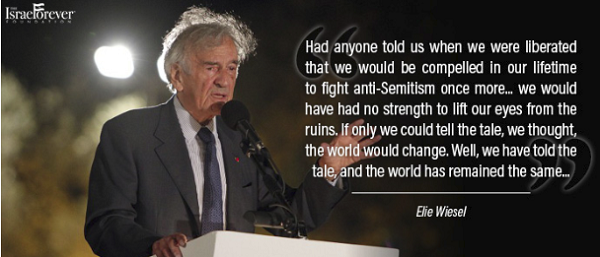
MOMENTARY SURVIVAL™ The success of demonstrating the unique circumstance of the human condition imposed on Jews and particularly Jews during the Holocaust was the severity of momentary survival - wherein life, survival, could not be measured in increments of time, but rather from experience to experience which, in turn, shaped the human response to subsequent experiences. As the Nazi machine of terror continued to deteriorate Jewish life in every possible way, life passed from one moment of survival to the next. In between - the moments of agony we, the non-witnesses, can never really know, can never truly understand. The response of the Jews was a direct result of this circumstance.
Visit Links in the Chain to learn more or contact Dr Heideman at elanayael@israelforever.org
Recommended for you:
HOLOCAUST AND HATIKVAH
Explore the connection between Holocaust, Hope and Israel in our effort to remember and make meaning out of our history as a people.
About the Author
